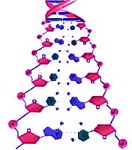Heredity
Heredity is the passing of traits to offspring (from its parent or ancestors). This is the process by which an offspring cell or organism acquires or becomes predisposed to the characteristics of its parent cell or organism. Through heredity, variations exhibited by individuals can accumulate and cause a species to evolve. The study of heredity in biology is called genetics, which includes the field of epigenetics.
Gregor Mendel: father of modern genetics
The idea of particulate inheritance of genes can be attributed to the Moravian[5] monk Gregor Mendel who published his work on pea plants in 1865. However, his work was not widely known and was rediscovered in 1901. It was initially assumed the Mendelian inheritance only accounted for large (qualitative) differences, such as those seen by Mendel in his pea plants — and the idea of additive effect of (quantitative) genes was not realised until R.A. Fisher's (1918) paper on The Correlation Between Relatives on the Supposition of Mendelian Inheritance.
Modern development of genetics and heredity
In the 1930s, work by Fisher and others resulted in a combination of Mendelian and biometric schools into the modern evolutionary synthesis. The modern synthesis bridged the gap between experimental geneticists and naturalists; and between both and palaeontologists, stating that:[6][7] All evolutionary phenomena can be explained in a way consistent with known genetic mechanisms and the observational evidence of naturalists.
Evolution is gradual: small genetic changes, recombination ordered by natural selection. Discontinuities amongst species (or other taxa) are explained as originating gradually through geographical separation and extinction (not saltation).
Selection is overwhelmingly the main mechanism of change; even slight advantages are important when continued. The object of selection is the phenotype in its surrounding environment. The role of genetic drift is equivocal; though strongly supported initially by Dobzhansky, it was downgraded later as results from ecological genetics were obtained.
The primacy of population thinking: the genetic diversity carried in natural populations is a key factor in evolution. The strength of natural selection in the wild was greater than expected; the effect of ecological factors such as niche occupation and the significance of barriers to gene flow are all important.
In palaeontology, the ability to explain historical observations by extrapolation from micro to macro-evolution is proposed. Historical contingency means explanations at different levels may exist. Gradualism does not mean constant rate of change.
The idea that speciation occurs after populations are reproductively isolated has been much debated. In plants, polyploidy must be included in any view of speciation. Formulations such as 'evolution consists primarily of changes in the frequencies of alleles between one generation and another' were proposed rather later. The traditional view is that developmental biology played little part in the synthesis, but an account of Gavin de Beer's work by Stephen Jay Gould suggests he may be an exception.[8]
Almost all aspects of the synthesis have been challenged at times, with varying degrees of success. There is no doubt, however, that the synthesis was a great landmark in evolutionary biology. It cleared up many confusions, and was directly responsible for stimulating a great deal of research in the post-World War II era.
Notes and references
- Conway Zirkle (1941). Natural Selection before the "Origin of Species", Proceedings of the American Philosophical Society 84 (1), p. 71-123.
- Mehmet Bayrakdar (Third Quarter, 1983). "Al-Jahiz And the Rise of Biological Evolutionism", The Islamic Quarterly. London. [1]
- Gary Dargan, Intelligent Design, Encounter, ABC.
- Patricia Skinner (2001), Unani-tibbi, Encyclopedia of Alternative Medicine
- Henig, Robin Marantz (2000). The Monk in the Garden : The Lost and Found Genius of Gregor Mendel, the Father of Genetics. Houghton Mifflin. ISBN 0-395-97765-7. "The article, written by an obscure Moravian monk named Gregor Mendel"
- Mayr & Provine 1998
^ Mayr E. 1982. The growth of biological thought: diversity, evolution & inheritance. Harvard, Cambs. p567 et seq.
- Gould S.J. Ontogeny and phylogeny. Harvard 1977. p221-2
